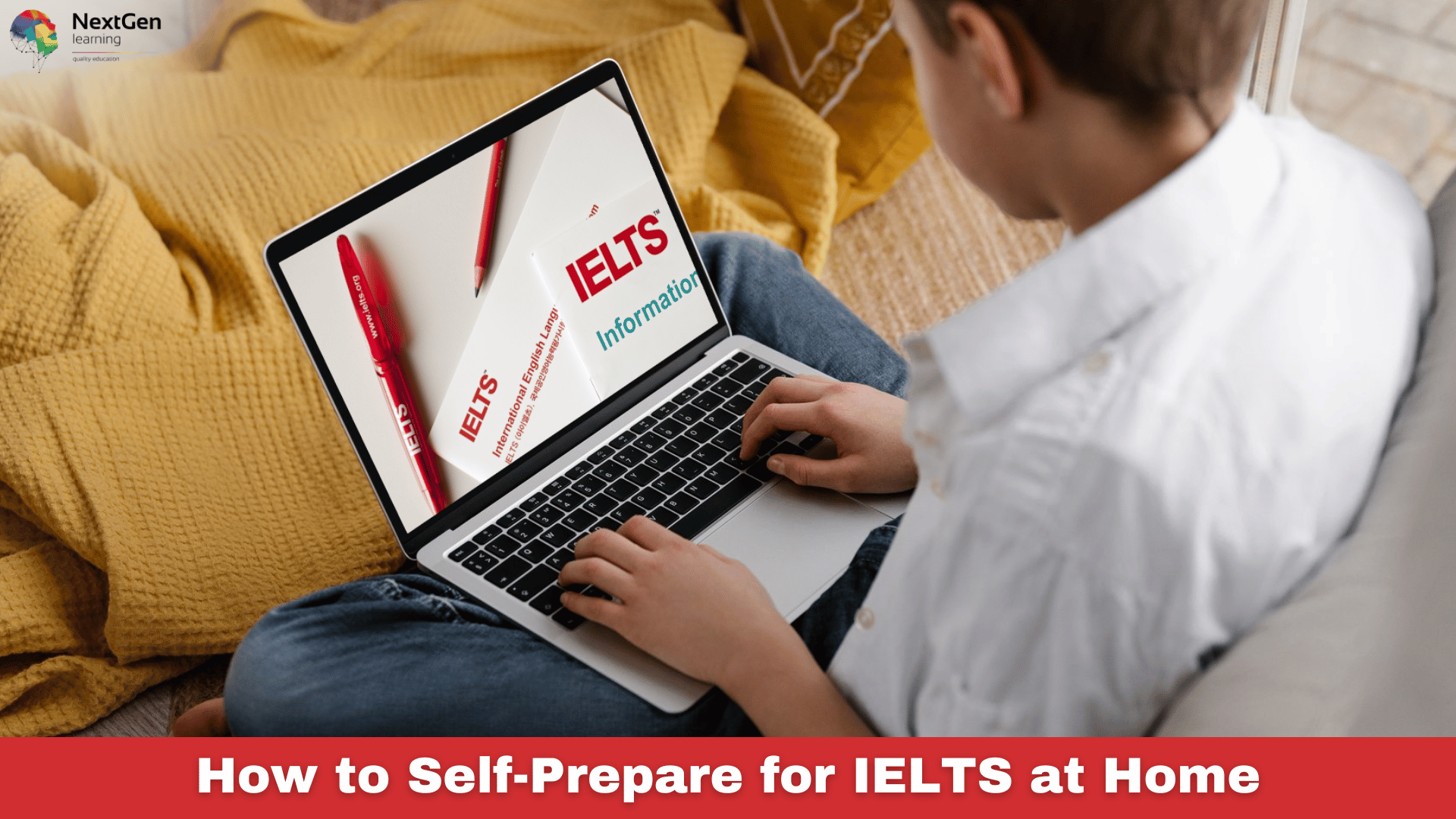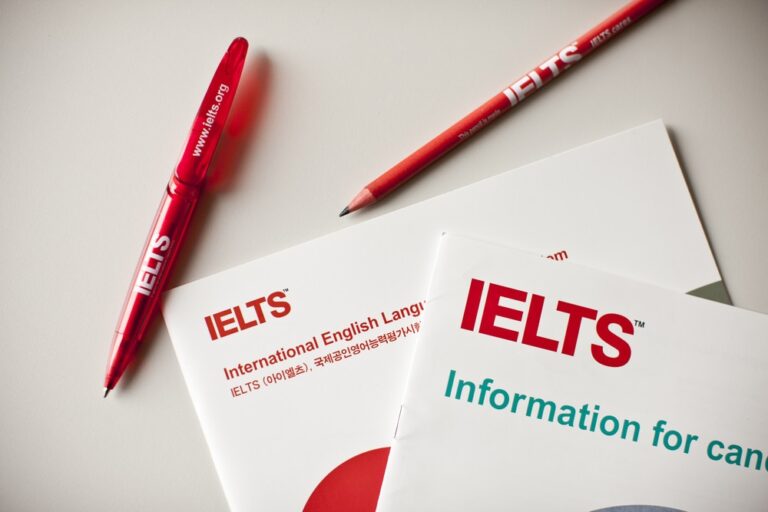
How to Self-Prepare for IELTS at Home
Want to study, work, or live abroad where English is the main language? IELTS is your passport! This English test checks your everyday and school skills. Besides, when you get a great score, universities will accept you, companies will be impressed, and some countries might even invite you to move there. Additionally, studying for the IELTS improves your listening, reading, writing, and speaking – all super useful skills! Therefore, IELTS is an investment in your future, opening doors to amazing opportunities abroad. Best of all, you can Self-Prepare IELTS at Home! With Self-Prep Tips, achieving English Language Proficiency and getting a great score is easier than you think!
Table of Contents
What is an IELTS Exam

The IELTS, or International English Language Testing System, is a test that measures your English language proficiency. It’s used for studying, working, or moving to English-speaking countries. You can self-prepare for the IELTS at home using self-prep tips to get a great score. This test checks your listening, reading, writing, and speaking skills, helping you prove your English abilities.
The IELTS is available in two types:
- IELTS Academic: Designed for those applying to study at undergraduate or postgraduate levels, or for professional registration.
- IELTS General Training: Typically for those migrating to English-speaking countries for secondary education, work experience, or training programs not at degree level.
How is the IELTS Exam structured?
The IELTS test has four main parts, and here’s how it’s structured:
IELTS Speaking (11-14 minutes): This is a face-to-face interview with an examiner (or a video call for the computer-based test). All IELTS candidates take the same speaking test.
IELTS Listening (30 minutes): This section consists of a 30-minute audio recording with 40 questions. All IELTS candidates take the same listening test.
IELTS Reading (60 minutes): This section consists of three reading passages with a total of 40 questions. Here’s where the Academic and General Training tests differ:
- Academic: The passages are taken from academic journals, books, and magazines.
- General Training: The passages are taken from brochures, advertisements, menus, letters, newspapers, notices, official documents, books, magazines, and other materials you might encounter daily.
IELTS Writing (60 minutes): This section consists of two writing tasks:
- Task 1 (Academic): In this task, you are required to write a report based on a chart, graph, diagram, map, or table.
- Task 1 (General Training): In this task, you are required to write a letter. This letter could be formal or informal, depending on the situation.
- Task 2 (Academic & General Training): This task is the same for both Academic and General Training tests. You are required to write a formal essay in response to a statement or question.
What are the formal requirements of the IELTS test?
The formal requirements of the IELTS test include a few key steps and essentials:
Registration: Sign up online or at a designated centre. Make sure to choose the right test format (Academic or General Training) depending on your needs.
Identification: You’ll need a valid passport or national ID for registration and on the test day.
Test Day Essentials: Pack essentials like pens, pencils, and an eraser for the paper-based test. Electronics are usually not allowed, but it’s best to double-check with your test centre.
Test Fees: There is a registration fee to take the test. Ensure you pay it on time.
To self-prepare for IELTS at home, use self-prep tips to practice each section. Understanding these requirements will help you focus on improving your English language proficiency and getting a great score. Preparing at home allows you to work at your own pace and build the skills you need for success.
Simple Steps to Score Well on the Self-Prepare IELTS at Home

1. Understand the Test Format
Listening: 4 sections, 40 questions, 30 minutes.
Reading: 3 sections, 40 questions, 60 minutes.
Writing: 2 tasks, 60 minutes.
Speaking: 3 parts, 11-14 minutes.
2. Create a Study Schedule
Allocate Daily Time: Spend 2-3 hours daily.
Weekly Focus:
- Monday: Listening
- Tuesday: Reading
- Wednesday: Writing
- Thursday: Speaking
- Friday-Sunday: Mixed practice and review
3. Practice Regularly
Daily Practice: Spend time on each skill.
Timed Sessions: Simulate test conditions.
4. Use Sample Tests
Official Materials: Use tests from the official IELTS website or trusted sources.
Simulated Exams: Take full-length practice tests once a week.
5. Expand Your Vocabulary
Flashcards: Use apps like Anki or Quizlet.
Word Lists: Study IELTS-specific vocabulary lists.
Daily New Words: Aim to learn 5-10 new words daily.
6. Focus on Weak Areas
Identify Weaknesses: Use practice test results to find weak areas.
Targeted Practice: Spend extra time on these sections.
7. Listen to English
Podcasts: Listen to podcasts like BBC Learning English or IELTS Energy.
Movies & TV Shows: Watch with subtitles, then without.
News: Listen to English news channels.
8. Read Widely
Newspapers & Magazines: Read publications like The Guardian or National Geographic.
Books & Articles: Choose a variety of genres and topics.
Summarize: Practice summarizing what you read.
9. Write Essays
Regular Writing: Write essays on different topics weekly.
Feedback: Get feedback from teachers or peers.
Structure Practice: Focus on the introduction, body paragraphs, and conclusion.
10. Practice Speaking
Speaking Partners: Find partners to practice with.
Record Yourself: Record and listen to your responses.
Fluency & Coherence: Focus on speaking smoothly and logically.
Additional Resources
- IELTS Practice Books: Cambridge Book 1-19, The Official Cambridge Guide, IELTS Official Practice Materials etc.
- IELTS Prep Apps: Magoosh, IELTS Prep App by the British Council
- Online Forums: IELTS Buddy, Reddit IELTS, NextGen Learning
- Free Online Course with Certificate: IELTS Exam Preparation
By following this plan, you’ll be well-prepared for the IELTS exam. Good luck!

IELTS Exam Preparation
How is the real IELTS exam different in difficulty from the Cambridge practice tests?
The real IELTS exam can be a tad tougher than the Cambridge practice tests. While the practice tests are a great way to get familiar with the format and difficulty level of the real exam, the actual test might use slightly more complex vocabulary and discuss topics that are a bit trickier. This means it’s important to challenge yourself with practice materials beyond the Cambridge tests to get yourself fully prepared for the real deal.
How long does the IELTS test last?
The IELTS test lasts a total of 2 hours and 45 minutes.
Here’s a breakdown of the test format:
- Listening: 30 minutes
- Reading: 60 minutes
- Writing: 60 minutes
- Speaking: 11-14 minutes (may be taken on a separate date)
The validity of your IELTS test score typically lasts for two years after the test date. This means you can use your score for applications to universities or immigration purposes for two years from the day you took the test.
It’s important to note that this is the general validity period, and there can be exceptions depending on the specific institution or program you’re applying to.
Can a better score improve the chance of a scholarship?

Scoring well on the IELTS is a big thumbs up for your scholarship chances. Here’s why: scholarships often look for students who can succeed in an English-speaking academic environment. A high IELTS score shows them you have the English skills to excel in your studies. So, the better you do on the test, the stronger your application will be!
On top of that, a great IELTS score can even make you eligible for scholarships that require high English proficiency. This opens up more doors for you to find the perfect scholarship to help fund your education.
Does taking the IELTS exam increase the chances of getting a job?
A high score on the IELTS exam can greatly improve your chances of getting a job, especially in the international market. Many global companies look for people who can speak and write English well. Getting a great score on the IELTS shows that you have strong English skills, which is important for working in an English-speaking environment. This can make you a more attractive candidate to employers looking for talented people from around the world.
How many hours do you need to prepare for the Self-Prepare IELTS at-home test in your busy schedule?
Preparing for the IELTS test depends on several factors such as your current English proficiency level, familiarity with the test format, and your target score. Generally, it’s recommended to spend at least 6-8 weeks preparing for the IELTS exam if you are aiming for a high score. This allows enough time to practice each section of the test (Listening, Reading, Writing, Speaking), familiarize yourself with the test format, and work on improving your language skills.
During this preparation period, it’s beneficial to dedicate a few hours each day to studying and practising. This could involve:
- Daily Practice: Engaging in activities that improve your English skills, such as reading English articles, listening to podcasts or news broadcasts, writing essays, and speaking with others in English.
- Mock Tests: Taking full-length practice tests under timed conditions to simulate the actual test experience and identify areas needing improvement.
- Language Improvement: Focusing on specific areas like grammar, vocabulary, pronunciation, and comprehension.
- Speaking Practice: Finding opportunities to speak in English, whether through language exchange programs, online forums, or with a tutor.
- Feedback and Correction: Getting feedback on your writing and speaking from a tutor or experienced speaker to identify and correct mistakes.
Remember, consistency is key! Even if you can only manage 30 minutes to an hour a day, consistent practice will significantly improve your English skills and help you achieve your desired IELTS score.
Conclusion
Preparing for the IELTS at home is a rewarding journey that opens doors to studying, working, and living in English-speaking countries. By following self-prep tips and dedicating time to practice listening, reading, writing, and speaking, you can improve your English proficiency and achieve a great score. Remember, consistency and targeted practice are key to success. Best of luck on your IELTS journey!
FAQs
Ans: To improve your English proficiency for the IELTS:
- Practice daily: Engage with English through reading, listening, writing, and speaking activities.
- Use resources: Utilize official IELTS practice materials and reputable apps for structured learning.
- Seek feedback: Receive feedback on your speaking and writing to refine your skills.
Ans: Self-preparing for the IELTS at home allows you to:
- Work at your own pace and convenience.
- Focus on your specific areas of improvement.
- Save costs associated with external preparation courses.
Ans: Preparing for the IELTS typically takes 6-8 weeks if aiming for a high score. Daily practice and regular mock tests are recommended to familiarize yourself with the test format and improve your language skills effectively.
Ans: Yes, a good IELTS score enhances your scholarship prospects by demonstrating your English proficiency, crucial for academic success in English-speaking environments.
Ans: A high IELTS score improves job opportunities, especially in international markets, by showcasing strong English skills valued by global employers.
Ans: On test day, bring a valid ID (passport or national ID), pens, pencils, and erasers for paper-based tests. Electronic devices are typically not allowed.
Ans: An IELTS score is generally valid for two years from the test date. Check specific institution requirements for any variations.
All Courses
Personal Development
639
Employability
402
Health & Care
318
Management
302
IT & Software
274
Business
263
Quality Licence Scheme Endorsed
250
Safety & First Aid
213
Teaching & Education
162
Accounting & Finance
146
Design & Technology
120
Construction & Engineering
116
Mental Health & Counselling
116
Sales & Marketing
111
Compliance & Law
97
Food & Nutrition
83
Science
71
Sports & Fitness
55
Language
50
Animal Care
41
Photography & Lifestyle
37
Makeup & Beauty
26
Programming & Coding
19
Cybersecurity
17
Business Communication
15
Career Bundle
14
Job Ready Programme
14
Development
10
Organizational Development
9
Leadership Development
8
Risk Management
6










0 responses on "How to Self-Prepare for IELTS at Home"